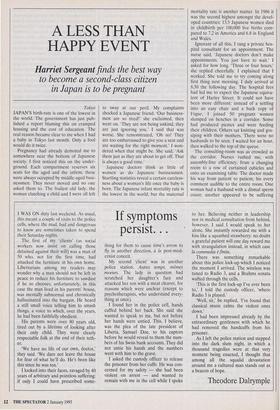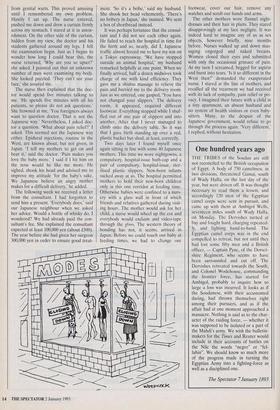A LESS THAN HAPPY EVENT
Harriet Sergeant finds the best way
to become a second-class citizen in Japan is to be pregnant
Tokyo JAPAN'S birth-rate is one of the lowest in the world. The government has just pub- lished a report blaming this on cramped housing and the cost of education. The real reason became clear to me when I had a baby in Tokyo last month. Only a fool would do it twice.
Pregnancy had already demoted me to somewhere near the bottom of Japanese society. I first noticed this on the under- ground. Each compartment reserves six seats for the aged and the infirm; these were always occupied by middle-aged busi- nessmen. They never moved and no one asked them to. The frailest old lady, the woman clutching a child and I were all left to sway at our peril. My complaints shocked a Japanese friend. 'Our business- men are so tired!' she exclaimed, then went on, 'They are not being unkind, they are just ignoring you.' I said that was worse. She remonstrated, 'Oh no! They are too embarrassed to give you a seat and are waiting for the right moment.' I won- dered when that might be. She said. 'Ask them just as they are about to get off. That is always a good time.'
Japanese doctors think as little of women as do Japanese businessmen. Startling statistics reveal a certain careless- ness about a woman's life once the baby is born. The Japanese infant mortality rate is the lowest in the world, but the maternal mortality rate is another matter. In 1986 it was the second highest amongst the devel- oped countries: 13.5 Japanese women died in childbirth per 100,000 live births com- pared to 7.2 in America and 6.8 in England and Wales.
Ignorant of all this, I rang a private hos- pital consultant for an appointment. The nurse said, 'Japanese doctors don't make appointments. You just have to wait.' I asked for how long. 'Three or four hours,' she replied cheerfully. I explained that I worked. She told me to try coming along first thing next morning. I duly arrived at 8.30 the following day. The hospital fees had led me to expect the Japanese equiva- lent of Harley Street. It could not have been more different: instead of a settling into an easy chair and a back copy of Vogue, I joined 50 pregnant women slumped on benches in a corridor. Some had produced picnics and were feeding their children. Others sat knitting and gos- siping with their mothers. There were no husbands to be seen. I waited for an hour, then walked to the top of the queue.
The consulting-room was as crowded as the corridor. Nurses rushed me, with assembly-line efficiency, from a changing room to a row of curtained cubicles and onto an examining table. The doctor made his way from patient to patient, his every comment audible to the entire room. One woman had a husband with a dismal sperm count; another appeared to be suffering from genital warts. This proved amusing until I remembered my own problem. Hastily I sat up. The nurse entered, pushed me down and drew a curtain firmly across my stomach. I stared at it in aston- ishment. On the other side of the curtain, hidden from my view, the doctor and his students gathered around my legs. I felt the examination begin. Just as I began to wonder how long I could bear this, the nurse returned, 'Why are you so upset?' she asked. I pointed out that an unknown number of men were examining my body. She looked puzzled. 'They can't see your face,' she assured me.
The nurse then explained that the doc- tor would spend five minutes talking to me. 'He spends five minutes with all his patients, so please do not ask questions.' She frowned at me, 'You foreigners always want to question doctor. That is not the Japanese way.' Nevertheless, I asked doc- tor a question. 'What about pain relief?' I asked. This seemed not the Japanese way either. Epidural injections, routine in the West, are known about, but not given, in Japan. 'I tell my mothers to get on and bear it,' said the doctor. 'Pain makes you love the baby more.' I said if I hit him on the nose would he like me more. He sighed, shook his head and advised me to improve my attitude 'for the baby's sake. We Japanese believe an angry mother makes for a difficult delivery,' he added.
The following week we received a letter from the consultant. I had forgotten to send him a present. 'Everybody does,' said our Japanese neighbour when we asked her advice. Would a bottle of whisky do, I wondered? We had already paid the con- sultant's fee. She explained the consultant expected at least 100,000 yen (about £500). The year before she had given her surgeon 300,000 yen in order to ensure good treat-
ment. 'So it's a bribe,' said my husband. She shook her head vehemently, 'There's no bribery in Japan,' she insisted. We sent a box of shortbread instead.
It was perhaps fortunate that the consul- tant and I did not see each other again. He failed to reach the hospital in time for the birth and so, nearly, did I. Japanese traffic almost forced me to have my son on a Tokyo expressway. 'We have stopped outside an animal hospital,' my husband remarked helpfully at one point. When we finally arrived, half a dozen midwives took charge of me with kind efficiency. They gave me a shiatsu massage to relieve the pain and hurried me to the delivery room. Just as we entered, one gasped, 'You have not changed your slippers.' The delivery room, it appeared, required different footwear. Everything stopped while I shuf- fled out of one pair of slippers and into another. After that I never managed to climb onto the delivery table. So it was that I gave birth standing up over a red, plastic bucket but shod, at least, correctly.
Two days later I found myself once again sitting in line with some 40 Japanese mothers. This timc we wore nightgowns, a compulsory, hospital-issue bath-cap and a pair of compulsory, hospital-issue, ster- ilised plastic slippers. New-born infants sucked away at us. The hospital permitted mothers to hold their new-born children only in this one corridor at feeding time. Otherwise babies were confined to a nurs- ery with a glass wall in front of which friends and relatives gathered during visit- ing hours The mother would ask for her child, a nurse would wheel up the cot and everybody would exclaim and video-tape through the glass. The western theory of bonding has not, it seems, arrived in Japan. Before we could touch our haby at feeding times, we had to change our footwear, cover our hair, remove any watches and scrub our hands and arms.
The other mothers wore flannel night- dresses and their hair in plaits. They stared disapprovingly at my lace negligee. It was indeed hard to imagine any of us as sex objects, however briefly, nine months before. Nurses walked up and down mas- saging engorged and naked breasts. Women closed their eyes and submitted with only the occasional grimace of pain. At my turn I screamed, begged for aspirin and burst into tears. 'Is it so different in the West then?' demanded the exasperated nurse. I stared at the line of mothers, and recalled all the treatment we had received with its lack of sympathy, pain relief or pri- vacy. I imagined their future with a child in a tiny apartment, an absent husband and no system of health visitors or even baby- sitters. Many, to the despair of the Japanese government, would refuse to go through the process again. 'Very different,' I replied, without hesitation.
One hundred years ago
THE TRIBES of the Soudan are still not reconciled to the British occupation of Egypt. A body of 750 camelmen, in two divisions, threatened Gamai, south of Wady Haifa, on the last day of the year, but were driven off. It was thought necessary to read them a lesson, and accordingly 120 men of the Egyptian camel corps were sent in pursuit, and came up with them at Ambigol Wells, seventeen miles south of Wady Haifa, On Monday. The Dervishes turned at bay and fought hard, charging repeated- ' ly, and fighting hand-to-hand. The Egyptian camel corps was in the end compelled to retreat, hut not until they had lost some fifty men and a British officer, — Captain Pyne, of the Dorset- shire Regiment, who seems to have been surrounded and cut off. The Dervishes retreated towards the South, and Colonel Wodehouse, commanding the frontier force, has started for Ambigol, probably to inquire how so large a loss was incurred. It looks as if the Soudanese, with their accustomed daring, had thrown themselves right among their pursuers, and as if the affair had at one moment approached a massacre. Nothing is said as to the char- acter of the raiding force, — whether it was supposed to be isolated or a part of the Mahdi's army. We wish the bulletin- makers for the Times and Reuter would include in their accounts of battles on the Nile the words "negro" or "fel- lahin". We should know so much more of the progress made in turning the Egyptian Army into a fighting-force as well as a disciplined one.
The Spectator 7 January 1893











































 Previous page
Previous page